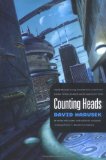Yesterday my copy of David Marusek’s Counting Heads arrived. I kind of took a flyer on this–I had heard a few good things around the net, but I didn’t have a positive recommendation from any of my usual sources.
Today, I found the Rick Kleffel–who is definitely one of my trusted sources for recommendations–had a decent length review of the book up.
And what’s more, the review seems almost designed to press my personal buttons. In the following excerpt, the emphasis is mine, highlighting lines that appeal to certain of my vanities or personal preferences:
Marusek’s novel is not an easy read. Forget the serene cover illustration. Once we get past the opening, we’re plunged into a future for which the word chaotic seems dangerously understated. The introduction is witheringly inadequate preparation for the utter strangeness that follows. With ‘Counting Heads’, Marusek has managed to create one of the most authentic and strange-seeming futures you’re likely to read. Cloned classes live in relative comfort, free-range humans struggle on the edges in corporate clans, while AIs, mentars, robots and wild nanotech pop in and out of the story. Here is a priest hoping to escape the earth. Here is an eternal child who is running out of money to preserve his youth. This is the kind of spiky, brainy science fiction that frightens those unfamiliar with the genre.
Marusek’s creation is nonetheless an utterly thrilling novel to read, assuming that you’re both prepared and inclined to read such a creation. Marusek simply immerses readers in an amazingly conceived creation that is so detailed, so intense and so bizarre it has the ring of truth at every turn. It is in any evaluation a brilliant creation, and the spiky consistency of Marusek’s prose makes the book a constant pleasure to read. This is not the kind of science fiction where a character stops and explains what’s going to happen. Be assured that there are info-dumps embedded here and there, but by and large Marusek simply lets readers walk through a world so changed most will find a challenge to hold on to their own sanity. If you can imagine giving someone from say, the year 1800 William Gibson’s ‘Pattern Recognition’, you’ll have an idea of what reading this book is like. As you read it, you’ll intuitively understand that you’re seeing a cohesive, coherent portrait of a world that quite logically follows on from ours. But every particular has been transformed. Only the human drama remains.
Yep, I just moved that a few places up in the too-read queue.



3 comments for “Counting Heads”